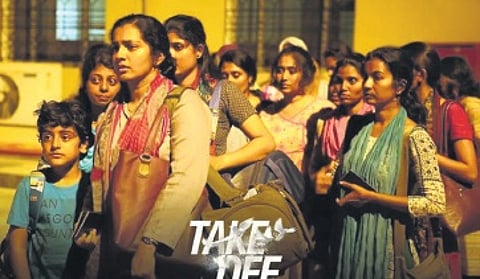

KOCHI: The proliferation of literary output from Kerala on the theme of migration for livelihoods to West Asia has a term: “petrofication”. Of the 2 million people who migrated from Kerala, nearly 90 per cent live and work in the Gulf countries.
Novels such as the 2008 bestseller, Benyamin’s Goat Days (that Mollywood turned into a monster hit called Aadujeevitham this year), Temporary People, Camels in the Sky, among others, draw attention to the humane or dehumanising experience around migration from Malayali writers around migrating to the Gulf for work.
Devi Yesodharan’s second novel, The Outsiders (Vintage, Penguin) is a well-deserved entrant into this petro literary club. It is to the author’s credit that she makes it an evocative human experience where the past and present collide in imagination, mythology and reality transmute to throw questions and offer answers, and the present’s poignancy finds solace in the wisdom of the past.
According to her, while the signs of Kerala’s successful West Asia migration are glaringly visible in the homes, food and money, “in literature however, the narratives are less straightforward,” and both “exist side by side.” As she observes, migration is “a complicated journey, one that requires reinvention, adjustment, where you lose as well as gain.”
Devi’s choice of a female protagonist — a working woman from Kochi who migrates for employment — breaks from the traditional narrative of men as primary breadwinners and spotlights the shifting roles of women in contemporary migration stories.
The peripatetic Devi, born in Kerala, had travelled through her childhood in the Middle East with her parents. “I grew up in the Middle East, but I was very close to my grandfather back in Kerala. So I was often homesick and longing to go back, particularly to my grandparents’ home. One of my earliest memories is sitting in his lap by the window, watching the lightning of a thunderstorm light up the garden every few minutes. But there I was, growing up in a rainless place,” she recalls.
By the sea
Not surprisingly, crossing the sea is a metaphor that repeatedly appears in Devi’s works. Her first literary venture, a historical fiction titled The Empire, follows a young Greek slave girl washed ashore on the coast of Nagapattinam, who rises through the military ranks in the 11th-century Chola Empire.
In her second, The Outsiders, the protagonist, Nita, a widowed mother and a teacher in Kerala, faces economic hardships and limited opportunities at home. She accepts a job as a live-in English tutor for a wealthy Arab family in Dubai. The journey marks a crossing into an unknown world of stark contrasts – wealth and poverty, belonging and “alien ordinariness,” always seen and treated as the other.
The ocean has been a steady presence as a facilitator of shifts in the protagonists’ lives symbolising both possibility and uncertainty. Devi says, “The sea is a next door, temperamental neighbour, and I was interested in how it can bring about both wealth and destruction. We are constantly trying to tame it, and often fail. I also see it as a witness that outlasts us, waits us out.”
Feeling the weight and isolation of her outsider status acutely in the glittering metropolis and finding her treatment more like a domestic worker than an educator, Nita seeks comfort in storytelling.
She narrates the story of Darius, an Egyptian setting sail in a ship to the ancient Muziris on the Malabar Coast to her young pupil’s mother, a lonely wife who also has left her homeland in Egypt. Nita recreates a world of adventure and possibilities, much like a Scheherazade whose fable lures the listener while protecting the storyteller from dreariness, drawing succour from the unwavering strength of the human spirit.
Story within a story
In Devi’s hands, the migrant experience in The Outsider represents the liminal space between identities, a place where neither Nita nor Darius fully belong. Restlessness and uprootedness, the solace of a fertile imagination are motifs that permeate Devi’s works. For both Nita and Darius, crossing the ocean and the entanglement of new relationships signifies a break from the familiar and a plunge into the unknown.
“Nita sends Darius to the home she has left behind, and you can sense her homesickness through that. You also see Darius chasing the things Nita wants: adventure, love, belonging,” she explains.
This “story within a story” structure allows Devi to explore the theme of displacement from multiple perspectives and time periods. The immigrant’s journey becomes a nested experience where the past and present coexist within one another. This layering creates a core that is complex and capable of holding multiple identities at once, much like the nesting doll with its intertwined, inseparable layers.
“The story changes with the migrant, even as it has echoes of home.”